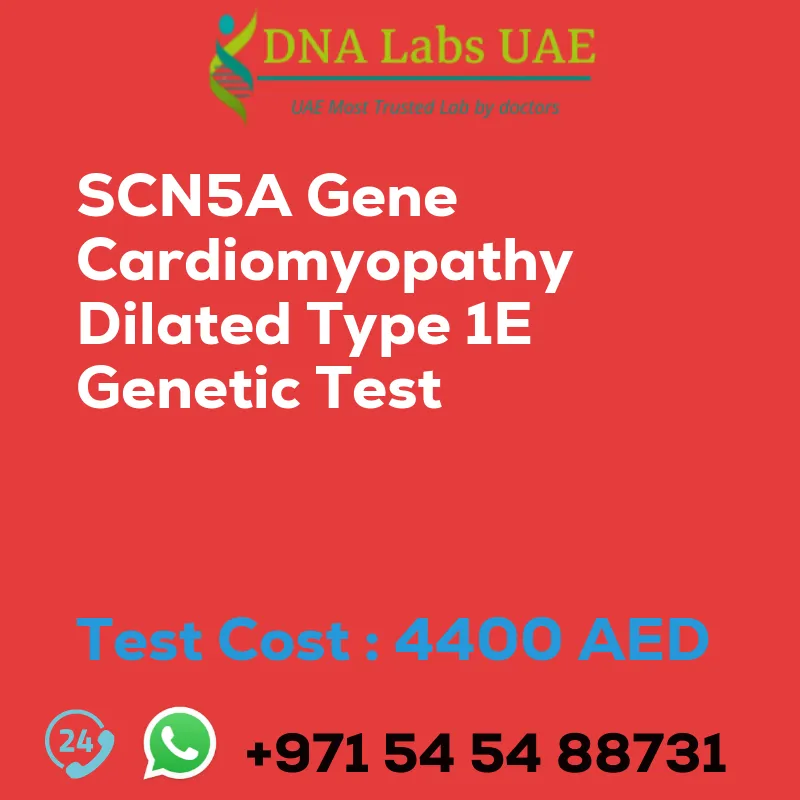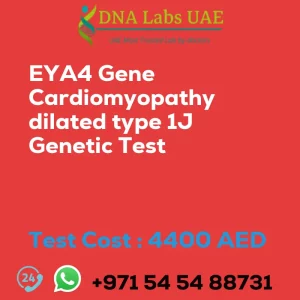SCN5A Gene Cardiomyopathy dilated type 1E Genetic Test
Components: SCN5A Gene Cardiomyopathy dilated type 1E Genetic Test
Price: 4400.0 AED
Sample Condition: Blood or Extracted DNA or One drop Blood on FTA Card
Report Delivery: 3 to 4 Weeks
Method: NGS Technology
Test type: Cardiovascular Pneumology Disorders
Doctor: Cardiologist
Test Department: Genetics
Pre Test Information: Clinical History of Patient who is going for SCN5A Gene Cardiomyopathy, dilated type 1E NGS Genetic DNA Test. A Genetic Counselling session to draw a pedigree chart of family members affected with SCN5A Gene Cardiomyopathy, dilated type 1E NGS Genetic DNA Test gene SCN5A
Test Details: SCN5A gene cardiomyopathy, dilated type 1E refers to a specific type of genetic cardiomyopathy caused by mutations in the SCN5A gene. This gene provides instructions for making a protein called the cardiac sodium channel, which is responsible for controlling the flow of sodium ions into heart muscle cells. Mutations in the SCN5A gene can disrupt the normal function of the cardiac sodium channel, leading to various heart abnormalities. Dilated cardiomyopathy is a condition characterized by the enlargement of the heart chambers and weakened heart muscle, which can lead to heart failure. Type 1E specifically refers to the subtype of dilated cardiomyopathy caused by mutations in the SCN5A gene.
NGS (Next-Generation Sequencing) genetic testing is a type of genetic test that uses advanced sequencing technology to analyze multiple genes simultaneously. In the context of SCN5A gene cardiomyopathy, dilated type 1E, NGS genetic testing can be used to identify mutations in the SCN5A gene that may be causing the condition. This genetic test involves collecting a DNA sample, typically through a blood sample or saliva sample, from the individual being tested. The DNA is then sequenced using NGS technology to identify any mutations or changes in the SCN5A gene. The results of the test can help in confirming a diagnosis, predicting the risk of developing cardiomyopathy, and guiding treatment decisions.
It is important to note that SCN5A gene cardiomyopathy, dilated type 1E is a rare condition, and genetic testing may not be necessary or recommended for everyone. The decision to undergo genetic testing should be made in consultation with a healthcare professional or genetic counselor who can assess the individual’s specific situation and provide guidance.
| Test Name | SCN5A Gene Cardiomyopathy dilated type 1E Genetic Test |
|---|---|
| Components | |
| Price | 4400.0 AED |
| Sample Condition | Blood or Extracted DNA or One drop Blood on FTA Card |
| Report Delivery | 3 to 4 Weeks |
| Method | NGS Technology |
| Test type | Cardiovascular Pneumology Disorders |
| Doctor | Cardiologist |
| Test Department: | Genetics |
| Pre Test Information | Clinical History of Patient who is going for SCN5A Gene Cardiomyopathy, dilated type 1E NGS Genetic DNA Test. A Genetic Counselling session to draw a pedigree chart of family members affected with SCN5A Gene Cardiomyopathy, dilated type 1E NGS Genetic DNA Test gene SCN5A |
| Test Details | SCN5A gene cardiomyopathy, dilated type 1E refers to a specific type of genetic cardiomyopathy caused by mutations in the SCN5A gene. This gene provides instructions for making a protein called the cardiac sodium channel, which is responsible for controlling the flow of sodium ions into heart muscle cells. Mutations in the SCN5A gene can disrupt the normal function of the cardiac sodium channel, leading to various heart abnormalities. Dilated cardiomyopathy is a condition characterized by the enlargement of the heart chambers and weakened heart muscle, which can lead to heart failure. Type 1E specifically refers to the subtype of dilated cardiomyopathy caused by mutations in the SCN5A gene. NGS (Next-Generation Sequencing) genetic testing is a type of genetic test that uses advanced sequencing technology to analyze multiple genes simultaneously. In the context of SCN5A gene cardiomyopathy, dilated type 1E, NGS genetic testing can be used to identify mutations in the SCN5A gene that may be causing the condition. This genetic test involves collecting a DNA sample, typically through a blood sample or saliva sample, from the individual being tested. The DNA is then sequenced using NGS technology to identify any mutations or changes in the SCN5A gene. The results of the test can help in confirming a diagnosis, predicting the risk of developing cardiomyopathy, and guiding treatment decisions. It is important to note that SCN5A gene cardiomyopathy, dilated type 1E is a rare condition, and genetic testing may not be necessary or recommended for everyone. The decision to undergo genetic testing should be made in consultation with a healthcare professional or genetic counselor who can assess the individual’s specific situation and provide guidance. |







